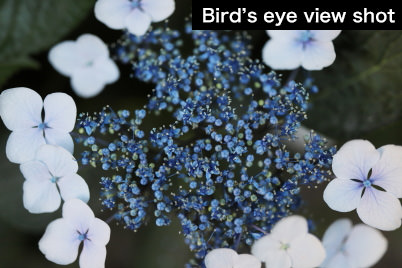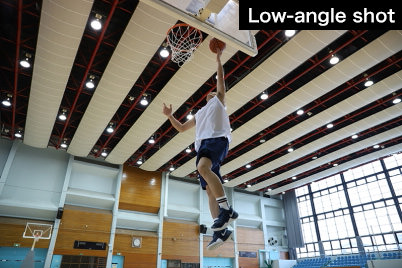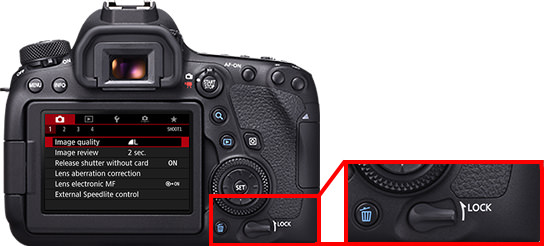What’s New on the EOS 6D Mark II: 13 Key Features (Part 2)
Following from our previous article, we explore another 6 new features on the EOS 6D Mark II, this time from the rear. (Photos by Ryo Ohwada & Jiro Tateno. Reported by Ryo Ohwada)

#8: 45-point all cross-type AF sensors for on-point subject acquisition
Not only has the number of AF points increased tremendously to 45, all of them are now cross-type sensors. The AF point at centre is capable of focusing in low-light conditions as dim as EV-3, so night photography is certainly no problem.
(Click here for samples of images shot with the EOS 6D Mark II, including low-light images)
Another large, convenient improvement comes in the form of the viewfinder display, which now utilizes Intelligent Viewfinder II. This displays various shooting information and the electronic level so that you do not have to take your eyes away from the viewfinder to check your camera settings.

#9: Skin tone detection & colour tracking for more accurate autofocusing on human subjects
On older cameras, there was a tendency for autofocus to fall on nearby or bright subjects when ‘Automatic selection AF’ was selected, which meant that for portraiture, especially with another object in the foreground, the user would need to specify the AF point. However, the 7,560-point RGB+IR metering sensor on the EOS 6D Mark II has led to improved colour tracking and skin tone detection capabilities, which means that you will be able to focus on faces without a hitch. This applies even if your scene involves depth, such as those where your main subject is in the middle ground with other objects in the foreground and background.

Colour tracking: On

EOS 6D Mark II/ EF35mm f/1.4L II USM/ FL: 35mm/ Aperture-priority AE (f/1.4, 1/60 sec, EV-0.3)/ ISO 100/ WB: Auto
Photo by Ryo Ohwada
Colour tracking: Off

EOS 6D Mark II/ EF35mm f/1.4L II USM/ FL: 35mm/ Aperture-priority AE (f/1.4, 1/80 sec, EV-0.3)/ ISO 100/ WB: Auto
Photo by Ryo Ohwada
#10: Bluetooth connectivity in addition to Wi-Fi/NFC
Support for both Wi-Fi and NFC on the EOS 6D Mark II lets you connect your camera to a smartphone quickly and easily (via the Camera Connect app, downloadable for free). Not only so, Bluetooth low energy technology is also supported, so that all you need is to pair your camera and smartphone once, and the camera will be able to maintain a constant connection as long as it is powered on.
For more information about what you can do with Wi-Fi and Camera Connect, check out the following articles:
Fun Ways to Use Your Camera’s Wi-Fi (Part 1): Introduction to Wi-Fi Features
Fun Ways to Use Your Camera’s Wi-Fi (Part 2): Real-Life Examples
6 Useful Tips for Remote Shooting via Wi-Fi with the Camera Connect App
Useful Tips for Backing Up Photos on the Camera Connect App
#11: More flexibility with angles with a Vari-angle LCD monitor
Yet another update on the EOS 6D Mark II is the Vari-angle LCD monitor, which enables you to shoot from all sorts of angles, even difficult ones, while maintaining a stable posture. From low positions barely skimming the ground to high positions with arms stretched out overhead, these are now all perfectly viable, greatly expanding the range of compositional variations available to you.
You may be interested in:
Decisions in Landscape Photography: High Angle or Low Angle?

Bird’s eye view shot

EOS 6D Mark II/ EF35mm f/1.4L II USM/ FL: 35mm/ Aperture-priority AE (f/1.4, 1/250 sec, EV-1.7)/ ISO 100/ WB: Auto
Photo by Ryo Ohwada
Low-angle shot

EOS 6D Mark II/ EF24-70mm f/1.4L IS USM/ FL: 24mm/ Manual exposure (f/4.5, 1/640 sec, EV±0)/ ISO 3200/ WB: Auto
EOS 6D Mark II/ EF24-70mm f/4L IS USM/ FL: 70mm/ Manual exposure (f/6.3 sec, 1/320 sec)/ ISO 500/ WB: Daylight
Photo by Jiro Tateno
Using the Vari-angle monitor, I positioned my lens level with a hermit crab that was crawling along the seashore, and then established focus on it with Touch AF.
#12: A more ergonomic Quick Control Dial for easier handling
While its function remains the same as the EOS 6D, the criss-cross (previously straight) knurling on the Quick Control Dial gives a better grip and also makes the wheel easier to turn. This ease-of-operation helps to balance out the controls to the left of the camera, which are a little less accessible than before due to the larger rear LCD monitor.

#13: Updated multi-function lock switch design
The design of the multi-function lock switch has been updated to the same design featured on the EOS 80D for additional usage-friendliness. You can select the controls to be ‘locked’ by the switch on the camera menu. These features include the touch screen, as well as the Main Dial, Quick Control Dial or Multi-Controller.

Interest piqued? Here's a review of the EOS 6D Mark II with sample images. For more details about the product including technical specs, click on the link in the product feature below.
Receive the latest update on photography news, tips and tricks.
Be part of the SNAPSHOT Community.
Sign Up Now!
About the Author
A monthly magazine that believes that enjoyment of photography will increase the more one learns about camera functions. It delivers news on the latest cameras and features and regularly introduces various photography techniques.
Published by Impress Corporation
Born in Tokyo in 1975. From around 1990, he came into contact with nature through fly fishing, and took up photography. From 1999, he travelled around the country taking photos with the theme of "Natural Beauty". He currently supplies photos for magazines, books, posters, calendars, and so on. He held an "Okinawa" photo exhibition in 2010, and "Northern Lights - Journey of Light/ Iceland" photo exhibition in 2017.
Born in Miyagi Prefecture in 1978, Ryo Ohwada graduated from the Tokyo Polytechnic University’s Graduate School of Arts. In 2005, his works were selected to be featured in the “reGeneration.50 Photographers of Tomorrow” exhibition at the Musée de l'Élysée in Switzerland. Other works have also been displayed both within and outside Japan, such as in the LUMAS gallery in Germany. Ohwada continues to showcase his unique works with the general public, actively contributing to magazines and advertising media well as holding frequent group and individual exhibitions. He is also a part-time lecturer at Tokyo Polytechnic University.





































